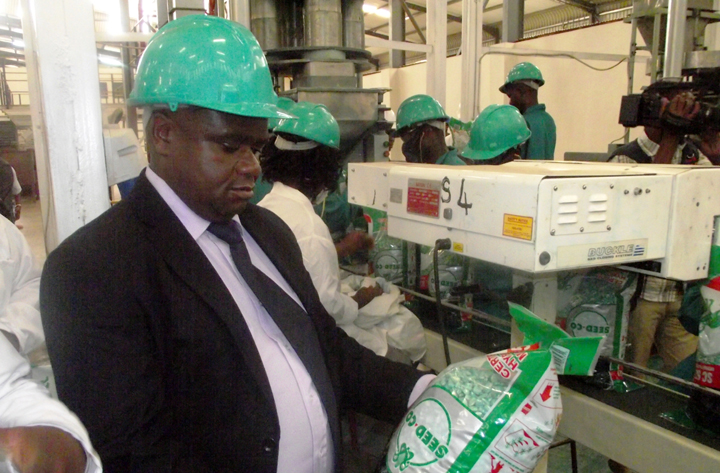Growth and early sales push SeedCo volumes
Seed processing concern, SeedCo International Limited (SCIL), says sales growth in Malawi and Tanzania as well as increased demand in Mozambique, resulted in volumes for the half year period to 30 September 2021 (FY2022), bulking 13 percent ahead of prior year.
The revenue for the period jumped to $35,6 million from $$27,9 million on the back of a better season preparedness, early sales activity in Malawi, Tanzania and Zambia and translation gains mainly in Zambia after the value of the Kwacha appreciated against the US dollar.
SCIL listed on the Botswana Stock Exchange in 2018 and in 2020, became the first to list on the new United States dollar-denominated Victoria Falls Stock Exchange.
SCIL was carved out of SeedCo Limited listed on the Zimbabwe Stock Exchange (ZSE) and SCL, a Zimbabwean domiciled company which is the second largest shareholder at 27,3 percent in Seed Co International.
The firm’s finance director, John Matorofa, in a brief to analysts yesterday, said the organisation is promoting on-line shop across its markets to add convenience and keep abreast with market developments.
Matorofa said the group’s 1st half profit reduced to $1,5 million from $2,5 million despite growth in revenue due to fall in other income because of non-recurring disposals, increase in operating costs owing to early selling season preparedness this year and the strengthening Zambian kwacha.
He said the Southern African Customs Union region (SACU) no longer includes RSA, eSwatini and Lesotho hence the fall in revenue by more than 50 percent for the markets.
Turnover in Zambia increased by 121 percent to $15,5 million mainly due to price adjustments and early season start while sales in Malawi more than doubled buoyed by early demand driven by the government inputs support programme. In Tanzania, sales increased 78 percent to $4,1 million driven by early demand.
In Kenya sales declined 17 percent due to drought while in Nigeria turnover was down 42 percent due to stock unavailability following production challenges due to heavy rains last season.
“Maize seed dominated both revenue and volume contribution driven by strong demand in Malawi, Tanzania and Zambia,” Matorofa said.
He added that soya seed sales increased compared to last year on account of better stocking and interest coming out of Mozambique. On other hand, other sales include wheat and bean sales in Zambia and Mozambique respectively.
During the period under review, Matorofa said the group released five new maize hybrid varieties in Zambia that will also be released in other markets.
These are the SC449, SC547, SC553, SC555, SC735 and SC547.
“SC553 and SC555 now qualify to be entered in the SADC Catalogue while SC733 launched in Zambia to compliment and gradually replace SC701 as a green mealie variety,” he said, adding that the group is on advanced stages to release soybean variety SC Signal in Nigeria.
“We are also expecting to release three soybean varieties in Ethiopia next year based on ongoing trials and we are also continuing rice hybrid trials in Southern, East and West Africa.”
Matorofa said the group has already started pilot commercial sales in Malawi, Tanzania, Nigeria and Zambia.
He said potato and cowpea hybrid registration trials are on-going and the group is working to introduce Canola Jazz in regional markets after pilot production in Zimbabwe.
In terms of seed production, Matorofa said product availability was somewhat affected by late season heavy rains last season in Southern Africa and Nigeria.
In Kenya, he said there are satisfactory stockholdings overall but some shortages could be experienced in some varieties, but current season production is planned to address key varietal shortages and stockouts in Kenya and Nigeria.
Matorofa said seed processing plants are generally working well Group wide with a new plant recently commissioned in Nigeria.
In Zambia, an own farm storage of 4,000 sqm and drier (14 bays) construction is nearing completion and this is expected to enhance early seed harvesting and grading capacity.
“We are introducing a cob harvesting and seed drying technology across the Group on the radar following pilot plant commissioning in Zimbabwe,” he said.
In terms of individual market performance, Zambia’s turnover was 21 percent higher at $16,5 million compared to prior year due to local price adjustments and translation gains as the Kwacha appreciated after the coming in of the new government.
In Malawi at $10,6 million, revenue more than double prior year due to better preparedness for the continuing huge Affordable Inputs Programme (AIP) launched by the new government last year.
“Overheads increased by about 40 percent due to the doubling of sales and distribution activities during the 1st half while profit after tax increased to $1,7 million from $1,1 million prior year driven by the turnover that grew faster than overheads.
In Tanzania revenue increased 76 percent to $4,1 million due to an 80 percent volume growth attributable to better season preparedness.
Matorofa said overheads increased by 15 percent because of more logistical costs of moving seed into the market early.
In Botswana, it was an off season period, hence no meaningful sales were recorded during the 1st half.
Matorofa said the group is expected to leverage its multi-geography footprint to mitigate drought headwinds in East Africa with the promising performance in Southern Africa.
He said Malawi and Zambia are set to end the year better than prior year while Tanzania is set to defy the drought odds and deliver stable performance.
Nigeria and Kenya are set to close the year on lower than prior due to product shortages and drought respectively, but Nigeria could recover from December production stocks expected to be sold in February/March next year.-eBusiness Weekly











